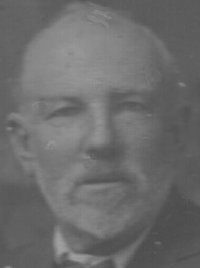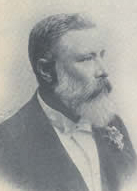In 1890, Henry Aldridge faced a Rockhampton Small Debts Court to answer questions over mining equipment that had not been paid for.

Henry Aldridge.
The proceedings were somewhat unusual and quite amusing as the formidable solicitor and politician Rees Rutland Jones deftly represented Henry and the case took an unusual turn.
(As an aside the firm that Mr Jones helped establish more than 150 years ago still operates from its Rockhampton chambers).
From the outset, Mr Jones had his opposing counsel on the back foot when he insisted Henry could not be called as a witness until his expenses were paid.
Henry (my great-great grandfather) had to travel about 25 miles from Mt Morgan; most likely by train, or possibly on horseback.
There followed an amusing scene that went as following as The Rockhampton Morning Bulletin reported:
On the case being called Mr Pattison asked Mr Aldridge to go into the witness box, but Mr Jones told him not to do so.
Mr Pattison said as Mr Aldridge was present he would have to give evidence.
Mr Jones: You will have to pay his expenses first.
Mr Pattison: I shall do nothing of the sort, as he is here. Get into the box, Mr Aldridge.
Mr Jones: He will do nothing of the sort. You pay his expenses from Mount Morgan first.
Curious shift

Rees Rutland Jones.
The Police Magistrate then said that Mr Aldridge wasn’t obliged to give evidence based on the matter of expenses.
But, as Mr Pattison pointed out, that had not been the procedure in previous cases.
The report details how that was answered:
The Police Magistrate said they had often done what was wrong. Mr Pattison could pay Mr Aldridge’s day expenses, and then he would have to go into the witness box.
Mr Jones then insisted that Mr Aldridge would also want his travelling expenses.
Reluctantly, it seems, Mr Pattison then placed five shillings on the table for the “day expenses”.
Money grab
Quick as a flash Mr Jones took up the money and again insisted that travelling expenses should also be allowed.
But the magistrate decided that because Mr Aldridge was already in court, he would have to settle for the five shillings.
The report went on:
Mr Aldridge then went into the witness box, and was examined by Mr Pattison. He denied that he had ever ordered the goods in question from Messrs. Williams Brothers, with the exception of two pails, which he had ordered for Mr Morrissey.
He admitted that he was a shareholder in the Mount Christie claim, but he denied that he had ordered the goods on account of that claim.
The shareholders in that claim were Messrs. Morrissey, James Stewart, D. Martin, A. E. Thomasson, D. Kilpatrick, C. Wilks, Mount Morgan, John Oates, Mount Morgan, and himself.
Witness had sold his share in the claim to Mr Kilpatrick, who was the secretary of the company.
Witness was the manager of the Mount Morgan Extended Gold-mining Company, of London, and he had purchased other things from Messrs. Williams Brothers, but he denied most positively that he was responsible for these things.

Aldridge mentions how Mount Morgan Extended director Ballard was wasting money.
Henry Aldridge later wrote about his involvement with the ill-fated Mount Morgan Extended company.
He was eventually sacked as manager after he challenged one of the directors, Robert Ballard, about mining equipment Ballard had ordered and which Aldridge said wasn’t needed.
The fallout between the pair came when Aldridge accused Ballard of making money for himself from the order.
A non-suit
But, on this occasion, Henry was to have a good day in court as the report reveals:
Mr Jones held that there was not the slightest tittle of evidence against the defendant, and the plaintiffs had not proved that the goods had been delivered.
The P.M. said he thought he had better grant a non-suit, and the plaintiffs could then join the other shareholders in the claim with Mr Aldridge.
It was a very hard case for the plaintiffs.
Mr Jones: It is a very hard case for Mr Aldridge that he should have been singled out from the other shareholders.
The P.M. then entered a non-suit against the plaintiffs.
In one last move, Mr Jones insisted on costs, but the magistrate did not agree.
You have got that five shillings; and you ought to be satisfied.
POSTSCRIPT: About four months later, Henry Aldridge willingly entered the witness box on another matter with Mr Pattison representing an aggrieved former employee. Mr Jones appeared for Henry and he won the case.
NOTE: According to an online legal dictionary, a non-suit is a judgment given against a plaintiff in which the court dismisses a case because the plaintiff either was unable to make an adequate showing or is unwilling to continue with the case.

